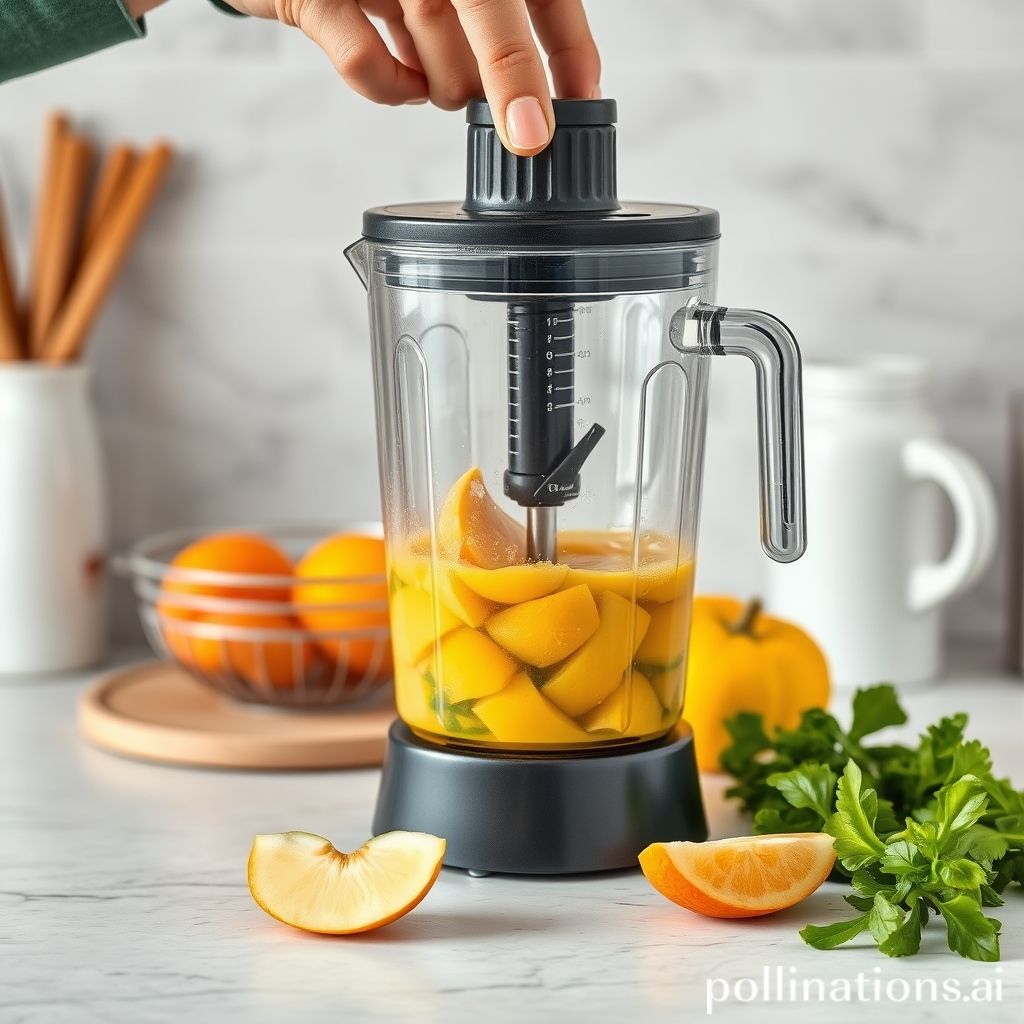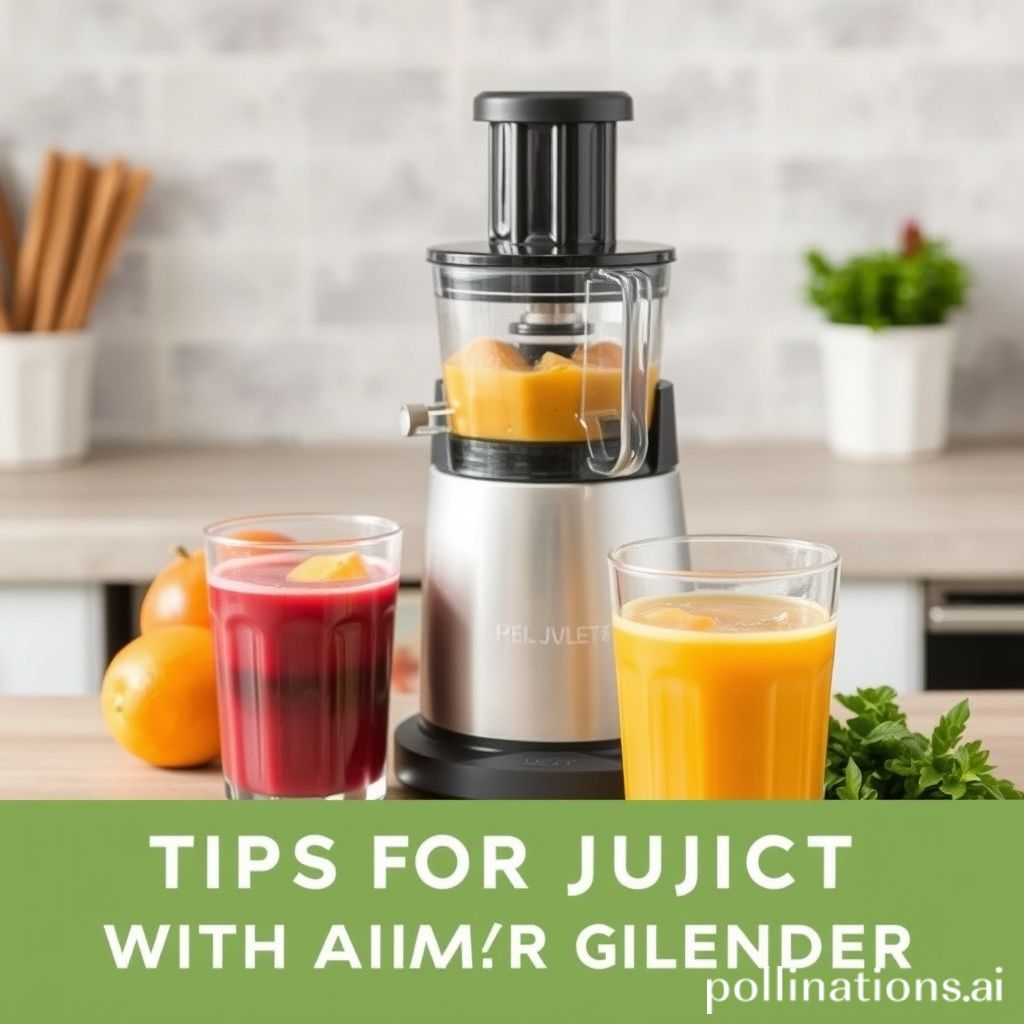Can Mixer Grinder Be Used As Juicer?
Using a mixer grinder as a juicer is a question that many people are asking. Instead of investing in a separate juicer, they want to know if their existing kitchen appliance can do the job.
This curiosity has sparked a debate among home cooks and nutrition enthusiasts. Can a mixer grinder truly extract the same quality of juice as a dedicated juicer? Some argue that the blades of a mixer grinder may not be able to effectively separate the pulp from the juice, resulting in a less smooth and less nutritious drink. In this article, we will explore the possibilities and limitations of using a mixer grinder as a juicer, and whether it can deliver the same fresh and healthy juices that a juicer can provide.

Table of Contents
Perceiving the Differences Between a Mixer Grinder and a Juicer
1. Functionality of a Mixer Grinder
A mixer grinder is a versatile kitchen appliance used for grinding, blending, and mixing ingredients. It consists of a motor, jars with sharp blades, and different speed settings. Its main purpose is to grind spices, make purees, and blend ingredients for various recipes.
2. Functionality of a Juicer
A juicer is specifically designed to extract juice from fruits and vegetables. It has a juicing mechanism that separates the juice from the pulp, allowing you to enjoy fresh and nutritious juices. Juicers come in different types, including centrifugal juicers and cold-press juicers, each with its own method of extracting juice.
3. Key Differences Between the Two Appliances
The main difference between a mixer grinder and a juicer lies in their functionality and purpose. Whilst a mixer grinder is primarily used for grinding and blending, a juicer is solely dedicated to extracting juice. Here are some key differences:
| Mixer Grinder | Juicer |
|---|---|
| Can grind spices, make purees, and blend ingredients | Extracts juice from fruits and vegetables |
| Retains the fiber and pulp of ingredients | Separates the juice from the pulp |
| Multiple jars for different functions | Single or multiple juicing attachments |
Whilst a mixer grinder can be used to extract some juice by blending fruits or vegetables, it may not yield the same quality as a dedicated juicer. The juicer’s mechanism ensures maximum juice extraction and separates the pulp, resulting in a smoother consistency. Therefore, if you enjoy fresh juices frequently, investing in a juicer would be a better option.
Expert Tips: Choose a mixer grinder for versatile cooking tasks, but invest in a juicer for fresh and nutritious juices.Using a Mixer Grinder for Juicing
1. Examining the Feasibility of Using a Mixer Grinder as a Juicer
Many individuals ponder if their current mixer grinder can function as a juicer. Although a mixer grinder is primarily designed for grinding, blending, and mixing ingredients, it is feasible to utilize it for juicing as well. Conversely, certain factors should be taken into account before attempting to juice with a mixer grinder.
- Powerful Motor: To efficiently extract juice, a mixer grinder should possess a potent motor. It is advisable to employ a mixer grinder with a motor of at least 500 watts for juicing purposes.
- Juicing Jar: Some mixer grinders are equipped with a separate juicing jar or attachment. This jar is specifically designed for juicing and may feature a distinct blade configuration compared to the regular grinding jar.
- Preparation: Prior to juicing, fruits and vegetables need to be diced into small pieces to fit into the mixer grinder’s jar. This may necessitate additional effort and time compared to using a dedicated juicer.
2. Advantages of Using a Mixer Grinder for Juicing
Employing a mixer grinder for juicing offers several benefits:
- Cost-effective: If you already possess a mixer grinder, utilizing it for juicing obviates the need to invest in a separate juicer, thereby saving you money.
- Versatility: A mixer grinder can fulfill multiple functions, including grinding, blending, and juicing. It enables you to prepare a variety of recipes using a single appliance.
- Space-saving: Owning a mixer grinder instead of a separate juicer helps conserve kitchen counter space, especially if you have limited storage area.
3. Limitations of Using a Mixer Grinder for Juicing
In the course of employing a mixer grinder for juicing can be convenient, there are some limitations to keep in mind:
- Efficiency: Compared to dedicated juicers, a mixer grinder may not extract juice as efficiently. Some pulp or fiber may remain in the juice.
- Time-consuming: Juicing with a mixer grinder may take longer due to the need for pre-cutting ingredients and potentially straining the juice to remove excess pulp.
- Volume: Mixer grinders are typically designed for small to medium quantities. If you frequently need to juice large quantities of fruits or vegetables, a dedicated juicer may be more suitable.
| Advantages | Disadvantages |
|---|---|
| – Cost-effective | – Efficiency may be lower compared to dedicated juicers |
| – Versatile appliance | – Time-consuming due to pre-cutting and potential straining |
| – Saves space in the kitchen | – Not ideal for juicing large quantities |
Tips for Juicing with a Mixer Grinder
1. Choosing the Right Ingredients for Juicing
When using a mixer grinder as a juicer, it’s important to select the proper ingredients to ensure a tasty and nutritious juice. Here are some tips:
- Fresh and Ripe Fruits: Choose fruits that are fresh and ripe for the best flavor and nutritional value. Some popular options include oranges, apples, grapes, and watermelon.
- Leafy Greens: Add vitamins and minerals to your juice by including leafy greens like spinach, kale, or celery. These greens are rich in antioxidants and can enhance the health benefits of your juice.
- Herbs and Spices: Experiment with adding herbs and spices to your juice for extra flavor and health benefits. Mint, ginger, and turmeric are excellent choices that can give your juice a refreshing twist.
2. Preparing Ingredients for Juicing in a Mixer Grinder
Properly preparing the ingredients before juicing ensures smooth and consistent results. Follow these steps:
- Wash and Clean: Thoroughly wash all fruits, vegetables, and herbs before using them. This removes any dirt, pesticides, or residues that may be present.
- Cut into Small Pieces: Cut larger fruits and vegetables into smaller pieces that can easily fit into the mixer grinder. This helps achieve a smooth juice consistency.
- Remove Seeds and Pits: Remove any seeds, pits, or tough stems from the ingredients to prevent them from affecting the texture of the juice.
3. Adjusting the Settings and Speed for Optimal Juicing Results
To achieve the best juicing results with your mixer grinder, it’s essential to adjust the settings and speed appropriately. Here are some tips:
- Pulse Setting: Start with the pulse setting to break down the ingredients into smaller pieces. This makes it easier for the mixer grinder to extract the juice.
- Blend Setting: Once the ingredients are finely chopped, switch to the blend setting for a smoother consistency. Blend for a longer duration if desired.
- Sieve the Juice: After blending, use a fine-mesh sieve or a muslin cloth to separate the juice from any remaining pulp or solids.

Can a Mixer Grinder Be Used as a Juicer?
Many people wonder if they can use their existing mixer grinder to make fresh juices instead of buying a separate juicer. In the course of a mixer grinder can perform certain juicing tasks, it is not specifically designed for juicing. Here are some alternative options for juicing:
1. Factors to Consider when Purchasing a Separate Juicer
If you plan to make juices on a regular basis, it might be better to invest in a dedicated juicer. Before making a purchase, consider the following factors:
- Capacity: Choose a juicer that can accommodate the amount of juice you plan to make.
- Power: Look for a juicer with sufficient power to effectively extract juice.
- Easy to clean: Opt for a juicer that is easy to disassemble and clean after use.
2. Different Types of Juicers Available in the Market
There are various types of juicers available in the market, each with its own advantages and limitations. Consider the following options:
- Centrifugal juicers: These juicers work by shredding fruits and vegetables with a flat cutting blade and then spinning them at a high speed to extract the juice.
- Masticating juicers: Also known as slow juicers or cold press juicers, these juicers use a slow grinding and pressing method to extract juice, resulting in higher nutrient retention.
- Citrus juicers: Designed specifically for citrus fruits, these juicers are ideal for extracting juice from oranges, lemons, and grapefruits.
3. Advantages and Disadvantages of Investing in a Dedicated Juicer
In the course of a mixer grinder can be used to some extent for juicing, investing in a dedicated juicer offers several advantages:
- Efficiency: Dedicated juicers are designed to extract maximum juice from fruits and vegetables, resulting in a higher yield.
- Nutrient retention: Masticating juicers, in particular, preserve more nutrients due to their slow extraction process.
- Convenience: Juicers often come with features like wide feeding chutes and easy-to-clean parts, making the juicing process more convenient.
Ultimately, the decision to use a mixer grinder or invest in a dedicated juicer depends on your juicing needs and preferences. Consider the available options and choose the one that suits you best.
| Information |
|---|
| Factors to Consider when Purchasing a Separate Juicer |
| Different Types of Juicers Available in the Market |
| Advantages and Disadvantages of Investing in a Dedicated Juicer |
Maintaining and Cleaning a Mixer Grinder for Juicing
1. Proper Cleaning Techniques for Juicing with a Mixer Grinder
When using a mixer grinder for juicing, it is important to follow proper cleaning techniques to ensure cleanliness and preserve the quality of your juices. Here are some steps to effectively clean your mixer grinder:
- Step 1: Disconnect the mixer grinder from the power source and disassemble the jar, blades, and lids.
- Step 2: Rinse the jar, lid, and blades under running water to remove any remaining juice or pulp.
- Step 3: Use a mild dishwashing liquid and a sponge or brush to scrub the jar, lid, and blades, making sure to remove all residues.
- Step 4: Thoroughly rinse everything to eliminate any soap residue.
- Step 5: Completely dry all the parts before reassembling the mixer grinder.
Remember to clean your mixer grinder after each use to prevent the growth of bacteria and maintain the freshness of your juices.
2. Tips for Maintaining the Longevity of a Mixer Grinder Used for Juicing
If you frequently use your mixer grinder for juicing, it is important to take proper care of it to ensure its longevity. Here are some tips to help you maintain your mixer grinder:
- Tip 1: Avoid overloading the jar with fruits or vegetables as it can strain the motor and affect its performance.
- Tip 2: Cut the fruits or vegetables into smaller pieces before juicing to prevent excessive strain on the blades.
- Tip 3: Do not run the mixer grinder continuously for a long period. Give it short breaks to prevent overheating.
- Tip 4: Clean the mixer grinder promptly after each use to prevent the buildup of residue and prolong its lifespan.
3. Recommended Cleaning Schedule for Juicing Purposes
Establishing a regular cleaning schedule for your mixer grinder used for juicing is essential to maintain its performance and cleanliness. Here is a recommended cleaning schedule:
| Frequency | Cleaning Task |
|---|---|
| After every use | Rinse the jar, lid, and blades under running water and thoroughly dry them. |
| Weekly | Disassemble the mixer grinder and clean all the parts with mild dishwashing liquid. |
| Monthly | Deep clean the mixer grinder by soaking the jar, lid, and blades in a mixture of warm water and vinegar. |
Following this cleaning schedule will help you maintain the cleanliness of your mixer grinder Meanwhile ensuring its smooth functioning for juicing purposes.
Conclusion
At the same time a mixer grinder can perform some basic juicing tasks, it is not designed to extract juice as efficiently as a dedicated juicer. The lack of specialized components in a mixer grinder may result in lower juice yield and a less smooth consistency.
In contrast, for occasional or small-scale juicing needs, a mixer grinder can still be a convenient option. It is important to consider your specific juicing requirements and the level of convenience you seek before deciding between a mixer grinder and a juicer.
Faq about using a mixer grinder as a juicer
FAQ 1: Can a mixer grinder extract juice from fruits and vegetables?
Yes, a mixer grinder can extract juice from fruits and vegetables. Nevertheless, it is important to note that In the course of a mixer grinder can extract juice, it may not be as efficient as a dedicated juicer.
FAQ 2: Will using a mixer grinder for juicing affect the taste and nutritional value of the juice?
Using a mixer grinder for juicing may slightly affect the taste and nutritional value of the juice. The blades of a mixer grinder tend to heat up during the process, which can result in some loss of enzymes and nutrients. Nevertheless, the impact is minimal and the juice will still retain a significant amount of nutrients and taste.
FAQ 3: Are there any specific mixer grinder models that are recommended for juicing?
Yes, there are mixer grinder models that are specifically designed for juicing. These models typically come with separate jars or attachments that are optimized for juicing. It is recommended to choose a mixer grinder with a higher wattage for better performance in juicing.
FAQ 4: Can a mixer grinder be used to make smoothies as well?
Yes, a mixer grinder can be used to make smoothies. Most mixer grinder models come with a blending jar or attachment that can be used to blend fruits and other ingredients into a smoothie consistency.
FAQ 5: What other functions can a mixer grinder perform apart from juicing?
Apart from juicing, a mixer grinder can perform various other functions. It can be used for grinding spices, making pastes, pureeing ingredients, whipping cream, and even chopping vegetables. The versatility of a mixer grinder makes it a valuable kitchen appliance.
Read Similar Post:
1. Should You Invest in a Cold Press Juicer? Find Out Now!
2. Creative Uses for Carrot Pulp: Recipes and Ideas for Leftover Juicer Residue


